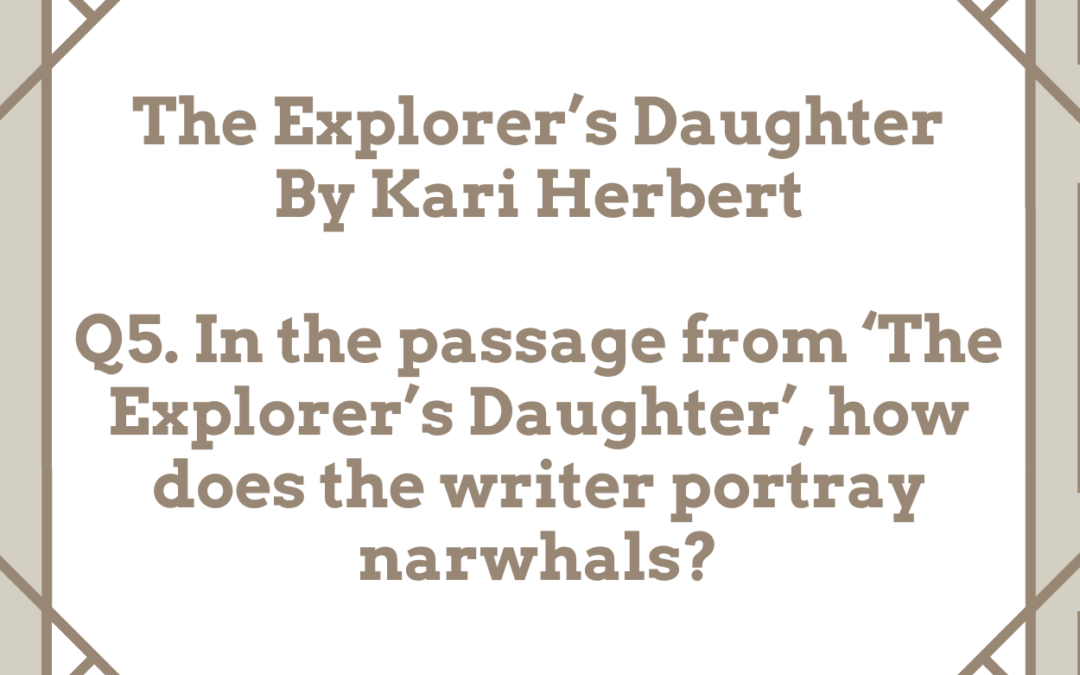Edexcel English IGCSE: Explorer’s Daughter by Kari Herbert
Q5. In the passage from ‘The Explorer’s Daughter’, how does the writer portray narwhals?
In your answer, think about:
- the descriptions of the narwhal;
- the importance of the narwhal to the Inughuits;
- the writer’s feelings towards the hunt;
- the writer’s use of language.
You should refer closely to the passage to support your answer. You may use brief quotations.
Edexcel English IGCSE Model Essay by an Expert
Kari Herbert has great respect for the narwhals in their natural setting, but also recognises the centrality of narwhal-hunting to the survival of the Inughuits.
The living narwhal is described with great respect for its beauty and intelligence. The passage opens with a poetic description of the natural setting, of which the narwhals are a beautiful part: “the plumes of spray” create a “spectral play of colour”, which creates a striking visual image for the reader. In this description, there is also a sense of mystery surrounding the narwhals: “I fell to wondering if the narwhal existed at all”. This makes them seem like beautiful illusions. Herbert also highlights the intelligence of the narwhals. By using human vocabulary in the statement “they talk to one another” (as opposed to, for example, “they communicate”) makes them seem extremely intelligent. Their hearing is also described as more developed than humans’, again portraying Herbert’s respect for them.
However, Herbert also acknowledges the importance of hunting narwhals to the lives of the Inughuits. After the sentimental description of the narwhals in their beautiful natural setting, Herbert adopts a factual tone to describe the various uses for the narwhal’s body. This may shock to the reader: “the dark rich meat” and “the blubber” is difficult to think about when the reader has built respect and emotional attachment for the animal. However, Herbert goes on to describe the essential uses of the narwhal, such as food, heat and shelter, forcing the reader to reconsider their aversion to these animals being hunted. Herbert also explains why hunting narwhals is still necessary in the modern world: there is “only one” supply ship per year, and the supply-carrying plane can “only carry” a small amount of goods. The repetition of “only” shows that this modern intervention is not enough to justify ceasing the practice of whale-hunting.
Herbert herself experiences this conflict between attachment to the narwhal and the knowledge that they have to be killed in order for the Inughuits to survive. This conflict is expressed through a battle between Herbert’s head and heart. She respects the hunter for his bravery in daring to do something so dangerous yet so crucial. However, her emotional side also wants the whale “to dive, to leave, to survive”. The language techniques in this short phrase – the triple infinitive structure, assonance and alliterative repetition of the letter ‘v’ – create an exaggerated sense of drama and tragedy, showing Herbert’s awareness that she is being irrationally affected by her emotional attachment to the animal.
Although the narwhals are portrayed as beautiful and intelligent, and Herbert acknowledges that it is natural to want them to live, she also shows the importance of their being hunted, so that the Inughuits can survive.



